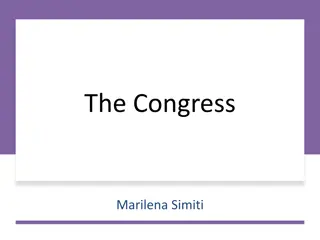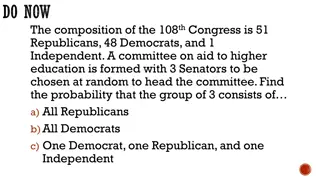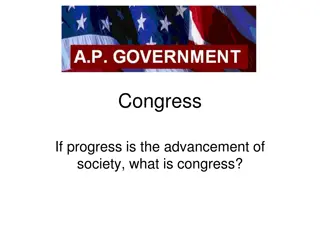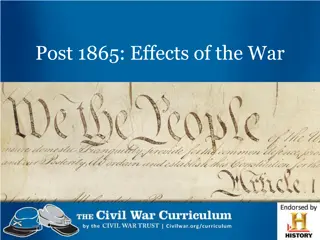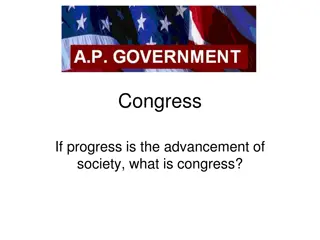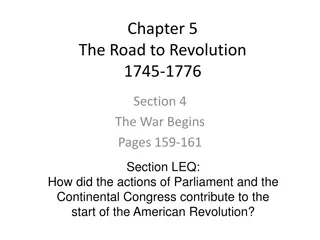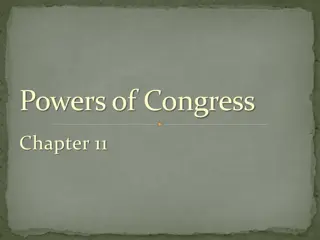Radical Republican Congress and Reconstruction Efforts
The Radical Republican-led Congress opposed President Johnson's lenient Reconstruction plans after the Civil War. They rejected Lincoln's approach, which led to the implementation of harsh Black Codes in the South. Congress pushed through laws like the Civil Rights Act of 1866 and the Freedman's Bureau Act of 1866 to protect the rights of freed slaves and address the challenges they faced. The Fourteenth Amendment aimed to grant citizenship and equal protection to all, but faced resistance from most Southern states.
Download Presentation

Please find below an Image/Link to download the presentation.
The content on the website is provided AS IS for your information and personal use only. It may not be sold, licensed, or shared on other websites without obtaining consent from the author.If you encounter any issues during the download, it is possible that the publisher has removed the file from their server.
You are allowed to download the files provided on this website for personal or commercial use, subject to the condition that they are used lawfully. All files are the property of their respective owners.
The content on the website is provided AS IS for your information and personal use only. It may not be sold, licensed, or shared on other websites without obtaining consent from the author.
E N D
Presentation Transcript
Congress, Under Radical Republican Leadership, Opposes Johnson
The Congresses that met in December 1865 and for several years thereafter were dominated by the Radical Republicans, a powerful group led by Senator Charles Sumner and Representative Thaddeus Stevens. Congress refused to recognize the leniently reconstructed southern governments or to seat their delegates. The radical Republicans condemned the entire Lincoln- Johnson reconstruction program. Why?
Why Did Congress Reject Lincolns Plan? The southern states had seceded and were now conquered provinces. Only Congress had the power to admit a state into the Union and so only Congress could determine the conditions for readmission. The South had to be treated harshly and be severely punished to deter any future challenge to federal authority. In the new southern state governments, the Democrats regained control. They prevented blacks from voting. These blacks would have voted Republican. Blacks in South were now regulated by state laws called Black Codes. Denied blacks the right to bear arms, serve on juries, and hold public office. Unemployed blacks might be sentenced to work as apprentices to white masters. The blacks needed protection.
Black Codes Problems blacks faced: no jobs, landless, poverty, illiteracy, lacking basic necessities, including clothing; The Black Codes were laws aimed at regulating the economic and social lives of freed slaves in order to keep them in an inferior position. Blacks could not serve on juries, carry weapons, testify against whites, or marry whites. Blacks had to obey a curfew and needed permits to travel. Not allowed to start their own businesses. In some states, could not rent or lease farmland.
Congressional Reconstruction 1. Civil Rights Act of 1866. Passed over Johnson s veto. Sought to weaken the black codes. The law gave blacks citizenship, equal rights with whites and authorized the use of federal troops for its enforcement. 2. Freedman s Bureau Act of 1866. Also passed over Johnson s veto. Provided the newly freed blacks with food, clothing and schooling, found them work and protected their civil rights, This law permitted the bureau to use military force if necessary.
Congressional Reconstruction cont. 3. Fourteenth Amendment. a. Made blacks citizens both of the US and of the state in which they resided. b. No state may deprive any person of life, liberty or property without due process of law, or deny to any person equal protection of the laws. c. A reduction in the Congressional representation of a state that deprived any of its male citizens of the right to vote; d. Disqualified most former Confederate leaders from holding office unless pardoned by Congress. Every southern state except Tennessee refused to ratify the Fourteenth Amendment.
Congress Comes Down Hard: The First Reconstruction Act divided all of the seceded states except Tennessee into five military districts; civilian courts in these districts replaced by military tribunals; each district under a major general who as to oversee the establishment of new state governments; Southern states required to give black males the right to vote; Before readmitted to Union, southern states had to ratify the 14thAmendment;
Johnson Impeached When Congress passed a law prohibiting the President from firing members of his Cabinet, Johnson fired his Secretary of War. Congress tried to remove Johnson from office, using a process known as impeachment(the political process of removing a public official). The House of Representatives voted to impeach Johnson, but not enough members of the Senate agreed to remove him. Johnson finishes his term as President.









